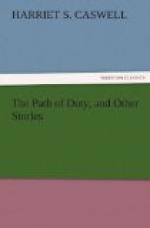measure, he proposed to the few neighbours which there
formed the settlement, that they should assemble at
one house, on each Sabbath afternoon, and listen to
the reading of a sermon by some one present.
“I think it our duty,” said he, “to
show our respect to the Sabbath-day by assembling ourselves
together, and uniting in worship to the best o’
our ability. I ha’e among my books a collection
o’ sermons by different divines, an’ I
am verra willin’ to tak’ my turn in the
readin’ o’ ane, an’ I’m sure
you should a’ be agreeable to do the same.”
His proposal met with the hearty approval of all his
neighbours, and for some years each Sabbath afternoon
saw most of the neighbours collected together for the
best mode of worship within their reach. The
bush settlements at this period were much infected
by bears, and they often proved very destructive to
the crops of the early settler, and also a cause of
no little fear. I believe the instances have
been rare when a bear has been known to attack a person,
although it has happened in some cases; but the immigrant
has so often listened to exaggerated accounts regarding
the wild animals of America, that those who settle
in a new section of country find it difficult to get
rid of their fears. On one occasion when the
Sabbath meeting met at Mr. Ainslie’s house, Mrs.
Ainslie urged her mother to remain and partake of
some refreshment before setting out on her walk homeward.
“Na, na,” replied the old lady. “I
maun e’en gang while I ha’e company, I
dinna expec’ to leeve muckle longer at ony rate,
but wouldna’ like to be eaten by the bears;”
and for several years the one who ventured alone to
the house of a neighbour after dark was looked upon
as possessing more courage than prudence. But
although the settlers often came across these animals,
on the bush-road, I never heard of one being attacked
by them. An old man, upon one occasion, returning
in the evening from the house of friends, and carrying
in his hand a torchlight composed of bark from the
cedar tree, met a large bear in the thick woods.
Being asked if he was not frightened, he replied, “Deed
I think the bear was ‘maist frightened o’
the twa’, for he just stood up on his twa hind
legs, and glowered at me for a wee while till I waved
the torch light toward him, when he gi’ an awfu’
snort, and ran into the woods as fast’s ever
he was able, an’ I cam awa’ hame no a bit
the war, an’ I think I’ll never be sae’
muckle feared about bears again.” But these
early settlers certainly found these animals very troublesome
from their frequent depredations upon their fields
of grain, and they often spent a large portion of
the night watching for them, prepared to give them
battle, but it was not often they saw one on these
occasions, for these animals are very cunning, and
seem at once to know when they are watched. It
sometimes also happened that during the early period
of this settlement people lost their way in the bush
while going from one house to another. A woman
once set out to go to the house of a neighbour who
lived about a mile distant. Supposing herself
on the right path she walked onward, till thinking
the way rather long she stopped and gazed earnestly
around her, and became terrified as she noticed that
the trees and rocks, and every other surrounding object
had a strange unfamiliar look; and she knew at once
that she had taken a wrong path.




